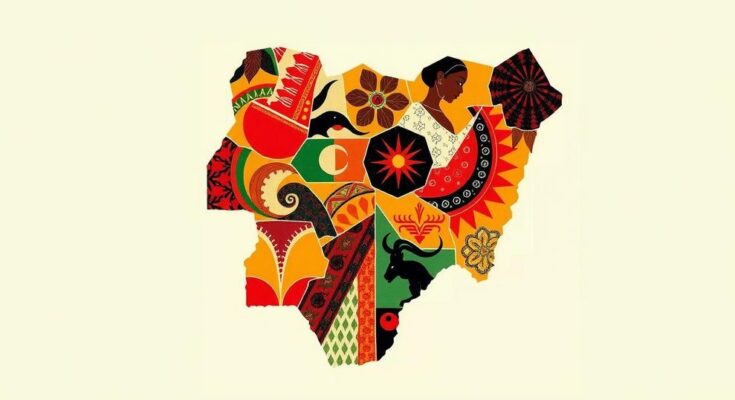Nigeria is grappling with severe ethnic tensions and political instability, exacerbated by the killing of northern hunters in Edo State. The Northern Elders’ Forum demands accountability from the Edo government, reflecting broader regional grievances. Economic disparities and religious divisions further complicate the situation, indicating an urgent need for reconciliation and effective governance.
Nigeria currently faces a precarious situation, characterized by deep-seated ethnic divisions and political tensions. The lack of a cohesive national identity, alongside regional disparities, poses significant challenges to the country’s unity. Political science delineates a nation-state as a centralized political organization governing a population with a shared identity, contrasting sharply with the potential for fragmentation seen in Nigeria’s diverse ethnic landscape.
Recent violence, particularly the killing of 16 northern hunters in Edo State, has exacerbated these tensions, revealing the fragile state of national cohesion. The Northern Elders’ Forum (NEF) has responded with demands for accountability regarding the incident, asserting the need for a public trial, an apology from the Edo authorities, and compensation for the victims’ families. These demands reflect the anger and distrust brewing among northern interests in response to perceived injustices.
Compounding the situation, Nigeria’s economic woes under the current administration contribute to escalating ethnic conflict. Statistics indicate that resource distribution inequity plays a significant role in fuelling tensions, particularly between the oil-rich South and the agriculturally oriented North. The historical grievances tied to resource allocation further complicate the already entrenched regional rivalries.
The actions of NEF following the Edo killings have revived memories of historical conflicts, such as the civil war precipitated by ethnic strife. Politics in Nigeria often revolves around immediate control of state resources rather than fostering long-term economic strategies. This short-sightedness denies the electorate stability and reflects deeper systemic issues within the governance framework.
Religious divides also play a critical role in Nigeria’s socio-political landscape, with ongoing tensions between Muslim and Christian communities further complicating governance. The implementation of Sharia law in northern states serves as a flashpoint in these struggles, underscoring the challenges of navigating a multi-religious society.
In a different incident, Governor Charles Soludo of Anambra State expressed concern over a destructive fire that affected several buildings in Onitsha, issuing warnings about safety regulations for residential areas. His call for adherence to building codes reflects the broader theme of governance challenges faced across Nigeria.
As a platform committed to independent journalism, The Southern Examiner seeks public support to continue its mission of providing factual and balanced reporting on such pressing issues. The complexities of Nigeria’s political, economic, and social landscapes demand rigorous examination to foster understanding and dialogue among its diverse populace.
In summary, Nigeria’s fragile unity faces dire threats from ethnic conflicts and economic disparities. The recent killing of northern hunters has reignited tensions, prompting the Northern Elders’ Forum to demand accountability and justice. Historical grievances regarding resource management and religious contention contribute further to instability. The intricacies of Nigeria’s challenges necessitate concerted efforts toward reconciliation and strategic policymaking to ensure a more harmonious coexistence among its diverse societal elements.
Original Source: thesouthernexaminer.com




